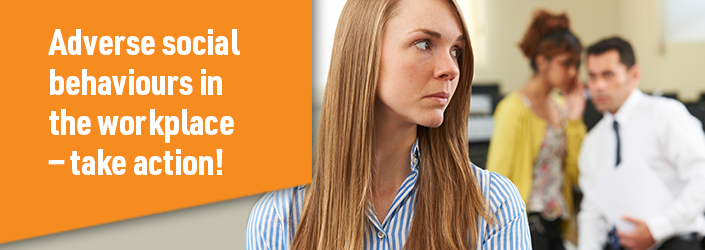Adverse Social Behaviours in the workplace

Everyday society is littered with distressing accounts of domestic violence and sexual harassment; they are just a few of the Adverse Social Behaviours (ASB).
Look at any social media platform or media outlet in the last few months and you will see the ‘well-overdue’ discussion of ASB ruining lives, workplaces, families and reputations.
Sadly, much of the problem lies with the broken system that powerful people face little sanction for their behavior. “Racism, sexism, and classism create imbalances in a system intended to be blind and without prejudice. Today, any reasonable observer has to have lost some faith in traditional modes of justice to protect the weak and the powerless”.[1] Four years on and this ‘lost faith’ is translating into rallies such as March 4 Justice and the social media movements #enoughisenough – fighting back and raising awareness of the plight of victims of sexual harassment and abuse, and domestic violence.
And yet, at the top tiers of politics in Australia today, this same fight continues where the victims are often ignored, silenced or discredited, rather than the ‘powerful’ punishing the perpetrators.
What effect does this have in everyday society and in the workplace?
These ASB affect everyday life at almost every level – family, the workplace and the community.
ASB ruin lives through personal impact and it costs business billions of dollars per year through absenteeism and replacement hiring. Many businesses are not addressing domestic violence as a workplace issue as it occurs at home. And yet, that occurrence doesn’t stay at home when the victim leaves to attend work. The two are directly connected – domestic violence is everyone’s business. [2]
“Domestic Violence is everyone’s business. Keeping domestic violence secret helps no one, has been shown to harm children, incurs substantial costs to society, and serves to perpetrate abuse through learned patterns of behavior.”[3]
ASB includes bullying and sexual harassment in the workplace
The workplace should be a safe environment but often it is not.
As discussed, domestic violence at home is also a workplace issue. The affected worker is likely to be suffering physical and/or mental abuse and this may affect their workplace attendance and performance. Further distress and suffering may compound their domestic issues if subjected to workplace bullying and harassment.
Workers unaffected by domestic violence may still be significantly affected by bullying (such as physical or verbal assault from students, staff or parents), sexual harassment, excessive workloads, time pressures, lack of consultation for change, lack of support and advice, racism and cultural exclusion, offensive emails or messages, lack of recognition and reward. [4]
How do you address these issues in the workplace?
Importantly, for any domestic violence or abuse, independent assistance can be sought at 1800RESPECT.org.au
At work, talk to your supervisor with the support of a colleague. If you feel that you can’t do this, call our office and the appropriate Organiser will assist you to get the support you need. The IEU are experts in workplace matters and support – 8410 0122.
Need more information on Domestic Violence at Work? The Diversity Council of Australia has produced a guide “Myth Busting Domestic & Family Violence at Work” – download that here.
Click on any source below for further reading.
[1] https://newrepublic.com/article/145964/broken-justice-system-led-sexual-harassment-crisis
[2] https://www.dca.org.au/research/project/myth-busting-domestic-family-violence-work
[3] https://www.acesdv.org/domestic-violence-graphics/domestic-violence-myths-and-misconceptions/
[4] https://www.mindyourhead.org.au/mental-health-safety/

